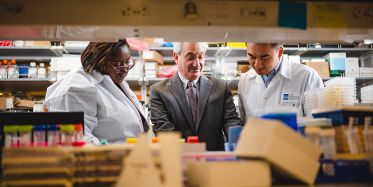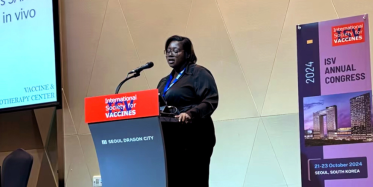David B. Weiner, Ph.D.
-
Executive Vice President
-
Director, Vaccine & Immunotherapy Center
-
W.W. Smith Charitable Trust Distinguished Professor in Cancer Research, Genome Regulation and Cell Signaling, Ellen and Ronald Caplan Cancer Center
-
Professor Emeritus, University of Pennsylvania School of Medicine
Weiner directs a translational molecular immunology research team focused on creating novel immunotherapy approaches for disease prevention and treatment using synthetic nucleic acid technology. Accomplishments of the team and collaborators include the first clinical studies of DNA vaccines, with a focus on advances in gene optimization and electroporation (EP)-mediated DNA delivery. Their work has revitalized the field, rapidly and safely moving new advances into human studies. These include the world’s first Zika vaccine, the first MERS vaccine, an advanced Ebola Vaccine, and a novel HIV vaccine, among others. Additionally, the Weiner laboratory has helped to develop immunotherapy approaches that are currently in clinical testing for HPV-associated cancer, prostate, liver, and other cancers. The first clinically efficacious therapeutic DNA vaccine for HPV cervical intraepithelial neoplasia (CIN) has moved into a licensure trial (REVEAL). His research has earned him many accolades, including the following limited selection: American Association for the Advancement of Science Fellow (2011); International Society for Vaccines Fellow (2012); NIH Directors Translational Research Award (2011); Top 40 Influential Vaccine Scientist (2014); Stone Family Award for Immunotherapy Cancer Research (2014); Vaccine Nation’s 50 Influential Vaccinologists (2015); Children’s Hospital of Philadelphia Hilleman Lectureship (2015); VIE Outstanding Academic Research Laboratory (2015 & 2016; runner-up in 2017-2019); Top 20 Nature Biotechnology Translational Laboratories (every year from 2016 to 2020); Pennsylvania Life Sciences Excellence Award (2019); President of the International Society for Vaccines (2018-2020); Pennsylvania Drug Industry Award in Scientific Excellence (2022); and the Genscript Outstanding Lab Award (2023).

Weiner received his B.S. in biology from Stony Brook University, N.Y., and his M.S. in biology from the University of Cincinnati. He then earned a Ph.D. in developmental biology with a focus on molecular immunology from the University of Cincinnati, College of Medicine. Weiner joined the University of Pennsylvania as a research fellow in the Department of Pathology and Laboratory Medicine, where he rose through the ranks to become Professor. He held a second appointment from The Wistar Institute from 1990 to 1993. At Penn, he served as co-chair of the Tumor Virology Program of the Abramson Cancer Institute and as chair of the Gene Therapy and Vaccine Training Program before moving to The Wistar Institute full time; he still retains professor emeritus status at Penn.
The Weiner Laboratory
The Weiner Laboratory
The Weiner laboratory represents one of the pioneering research teams in the field of DNA vaccines and immunotherapies. The lab has published more than 500 scientific papers, chapters and reviews, including many seminal papers in the DNA vaccine and synthetic nucleic acids field, and is credited with generating more than 70 patents. Along with collaborators, the Weiner Lab was the first to move DNA vaccines to human clinical studies, establishing their initial safety and immunogenicity. The team also helped to develop the new field of nucleic acid-encoded antibodies, or dMAbs. More than a dozen experimental clinical therapies and vaccines have been developed from research from the Weiner laboratory, including the first Zika vaccine in clinical trials, the first MERS vaccine, a novel Ebola vaccine as well as novel immunotherapy for HPV-associated cancer and precancer, and a novel immunotherapeutic vaccine for glioblastoma. Other notable reports from the Weiner lab include the first DNA vaccine studied for HIV and for immunotherapy of cutaneous T-cell lymphoma and the early development of DNA-encoded genetic adjuvants, including IL-12.
-
Senior Scientist
Elizabeth Parzych, Ph.D.
-
Postdoctoral Fellows
Ebony N. Gary, Ph.D.
Pratik Bhojnagarwala, Ph.D.
Michael (Xizhou) Zhu, Ph.D.
Mohammad Suhail Khan, Ph.D.
Shushu Zhao, Ph.D.
Sukanya Ghosh, Ph.D. -
Predoctoral Trainees
Nicholas Tursi
Jillian Eisenhauer
Niklas Laenger
Martina Tomirotti
Rumi Habib -
Research Assistants
Madison McCanna
Jacqueline Chu
Cory Livingston
Roopak Sadeesh
Bhavya Bhardwaj -
Project Manager
George Leslie, Ph.D.
-
Lab Coordinator
Jeneice Hubert
Research
Current Projects and Funding Sources
ZIKA VIRUS
The Zika virus has become a global health concern due to its rapid spread and concerning link to microcephaly in infants. The Weiner lab has received funding from the Bill & Melinda Gates Foundation for a collaborative project with Inovio Pharmaceuticals and HUMABS BioMed to develop DNA encoded monoclonal antibodies (DMAbs) against Zika. DMAbs are injected into the muscle and the human body is used as its own bioreactor to produce protective antibodies. Working with highly effective antibodies for which sequences were provided by HUMABS, the Weiner lab is optimizing DMAbs for high levels of expression, binding and neutralization. Once these DMAbs are shown to be protective in mice, they will be tested in nonhuman primates and eventually prepared for clinical trials with the assistance of Inovio.
-
Senior Scientist
Elizabeth Parzych, Ph.D.
-
Postdoctoral Fellows
Pratik Bhojnagarwala, Ph.D.
Ebony N. Gary, Ph.D.
Sukanya Ghosh, Ph.D.
Jinwei Huang, Ph.D.
Mohammad Suhail Khan, Ph.D.
Nicholas Tursi, Ph.D.
Shushu Zhao, Ph.D.
Michael (Xizhou) Zhu, Ph.D. -
Predoctoral Trainees
Jillian Eisenhauer
Niklas Laenger
Martina Tomirotti -
Research Assistants
Jacqueline Chu
Casey Hojecki
Joshua Jose
Cory Livingston
Roopak Sadeesh -
Research Project Manager
George Leslie, Ph.D.
-
Lab Coordinator
Jeneice Hubert
DNA VACCINE & DMAB CO-DELIVERY FOR VACCINAL EFFECT
Funded by the Bill & Melinda Gates Foundation, this study addresses the possibility of achieving vaccinal effect by co-delivering DNA-encoded monoclonal antibodies (DMAbs) and synthetic DNA vaccines to prevent HIV infection.
MALARIA
Funded by the Bill & Melinda Gates Foundation, the focus of this study is to develop new synthetic DNA vaccines encoding designed circumsporozoite protein (CSP) antigens to provide a new generation advanced CSP component for a prophylactic malaria vaccine.
INTEGRATED PRECLINICAL CLINICAL HIV VACCINE DEVELOPMENT PROGRAM
The Weiner lab has a long history of working on DNA vaccine for human immunodeficiency virus (HIV). The lab is currently a part of a multi-institutional group working on developing a prophylactic HIV vaccine under a five-year Integrated Preclinical/Clinical AIDS Vaccine Development Program grant from the National Institutes of Allergy and Infectious Disease (NIAID). Working with Inovio Pharmaceuticals, Duke University, Emory University, University of Massachusetts, and the National Institutes of Health, the group aims to build on the success of previous generations of DNA vaccines in order to induce strong cellular and humoral responses. The main focus of the program is inducing broad responses against the diverse HIV surface protein, Env.
VACCINE FOR BRCA-RELATED CANCERS
The Weiner lab has teamed up with investigators at the University of Pennsylvania to develop a novel vaccine to prevent cancer development in high-risk patient populations. This includes individuals who carry mutations in the BRCA1 or BRCA2 genes and are susceptible to the development of breast, pancreatic and ovarian cancer. This novel vaccine encodes the tumor antigen TERT, which is highly expressed in tumor cells, and is particularly high in tumor samples from patients with mutations in DNA damage repair pathways, such as the BRCA1/BRCA2 pathway. The lab developed this vaccine and is currently working to improve efficacy using combination therapies with immune checkpoint blockade antibodies in mouse models. In parallel, a clinical trial is being conducted for high-risk patients in remission after adjuvant therapy for TERT DNA vaccine with or without IL-12 immune plasmid adjuvant. This project is funded by a Breakthrough Science Team Award through the Basser Research Center for BRCA at the University of Pennsylvania.
OVARIAN CANCER
Funded by the Department of Defense (DoD), this study will characterize a novel vaccine targeting follicle stimulating hormone receptor (FSHR) in ovarian cancer.
COLLABORATIVE INFLUENZA VACCINE INNOVATION CENTERS (CIVICS) PROGRAM
The objective of this study is to support improvements in the immunogenicity and durability of seasonal influenza vaccines, and the development of innovative influenza vaccine approaches that provide robust, durable, broadly protective mucosal and systemic anti-influenza immunity (“universal influenza vaccines”). Research will support iterative vaccine design based on detailed immunologic assessment of influenza vaccine candidates through preclinical animal studies, early phase clinical trials and healthy volunteer human challenge studies, to advance the most promising vaccine candidates into phase 1/2 clinical trials.
LASSA VIRUS AND MERS CORONAVIRUS
Translational Platform Program encompassing cGMP manufacturing and clinical development of DNA vaccine candidates against both Lassa virus and MERS coronavirus, with funding from the Coalition for Epidemic Preparedness Innovations (CEPI).
NOVEL CORONAVIRUS COVID-19 EMERGENCY SUPPLEMENT
Funded by the Coalition for Epidemic Preparedness Innovations (CEPI), Wistar will support the development of a synthetic DNA vaccine and nanoparticles against Wuhan coronavirus 2019-nCoV. Successful characterization of the blocking antibody will permit us to explore monoclonal antibody production, engineer the monoclonal antibody into the synthetic DNA-based DMAb platform, and engineer into the nanoparticle platform as potential vaccines and immunotherapeutics against the Wuhan Coronavirus 2019-nCoV.
PSEUDOMONAS
This NIH-funded study addresses Novel DNA-encoded monoclonal antibodies (DMAbs) for control of antimicrobial tesistant (AMR) Pseudomonas aeruginosa infection.
TUBERCULOSIS
This NIH-funded study addresses development of a multivalent, DNA vaccine-mediated protection against Tuberculosis.
Weiner Lab in the News
Selected Publications
Alteration of the Tumor Stroma Using a Consensus DNA Vaccine Targeting Fibroblast Activation Protein (FAP) Synergizes with Antitumor Vaccine Therapy in Mice.
Duperret, E.K., Trautz, A., Ammons, D., Perales-Puchalt, A., Wise, M.C., Yan, J., Reed, C., Weiner, D.B. “Alteration of the Tumor Stroma Using a Consensus DNA Vaccine Targeting Fibroblast Activation Protein (FAP) Synergizes with Antitumor Vaccine Therapy in Mice.” Clin Cancer Res. 2018 Mar 1;24(5):1190-1201. doi: 10.1158/1078-0432.CCR-17-2033. Epub 2017 Dec 21.
Safety and Immunogenicity of an Anti-Zika Virus DNA Vaccine – Preliminary Report.
Tebas, P., Roberts, C.C., Muthumani, K., Reuschel, E.L., Kudchodkar, S.B., Zaidi, F.I., White, S., Khan, A.S., Racine, T., Choi, H., et al. “Safety and Immunogenicity of an Anti-Zika Virus DNA Vaccine – Preliminary Report.” N Engl J Med. 2017 Oct 4. doi: 10.1056/NEJMoa1708120. [Epub ahead of print]
An engineered bispecific DNA-encoded IgG antibody protects against Pseudomonas aeruginosa in a pneumonia challenge model.
Patel, A., DiGiandomenico, A., Keller, A.E., Smith, T.R.F., Park, D.H., Ramos, S., Schultheis, K., Elliott, S.T.C., Mendoza, J., Broderick, K.E., et al. “An engineered bispecific DNA-encoded IgG antibody protects against Pseudomonas aeruginosa in a pneumonia challenge model.” Nat Commun. 2017 Sep 21;8(1):637. doi: 10.1038/s41467-017-00576-7.
DMAb inoculation of synthetic cross reactive antibodies protects against lethal influenza A and B infections.
Elliott, S.T.C., Kallewaard, N.L., Benjamin, E., Wachter-Rosati, L., McAuliffe, J.M., Patel, A., Smith, T.R.F., Schultheis, K., Park, D.H., Flingai, S., et al. “DMAb inoculation of synthetic cross reactive antibodies protects against lethal influenza A and B infections.” NPJ Vaccines. 2017 Jul 6;2:18. doi: 10.1038/s41541-017-0020-x. eCollection 2017.
Safety, efficacy, and immunogenicity of VGX-3100, a therapeutic synthetic DNA vaccine targeting human papillomavirus 16 and 18 E6 and E7 proteins for cervical intraepithelial neoplasia 2/3: a randomised, double-blind, placebo-controlled phase 2b trial.
Trimble, C.L., Morrow, M.P., Kraynyak, K.A., Shen, X., Dallas, M., Yan, J., Edwards, L., Parker, R.L., Denny, L., Giffear, M., et al. “Safety, efficacy, and immunogenicity of VGX-3100, a therapeutic synthetic DNA vaccine targeting human papillomavirus 16 and 18 E6 and E7 proteins for cervical intraepithelial neoplasia 2/3: a randomised, double-blind, placebo-controlled phase 2b trial.” Lancet. 2015 Nov 21;386(10008):2078-2088. doi: 10.1016/S0140-6736(15)00239-1. Epub 2015 Sep 17.


